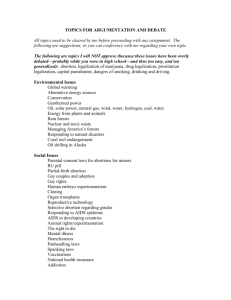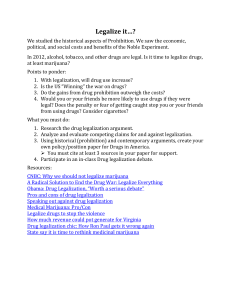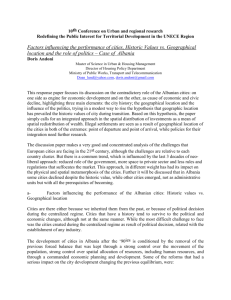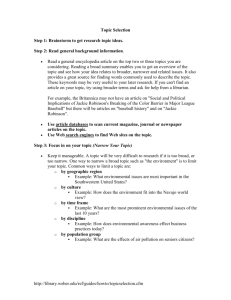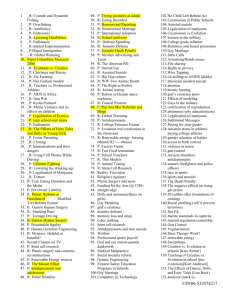The War on Drugs (609)
advertisement
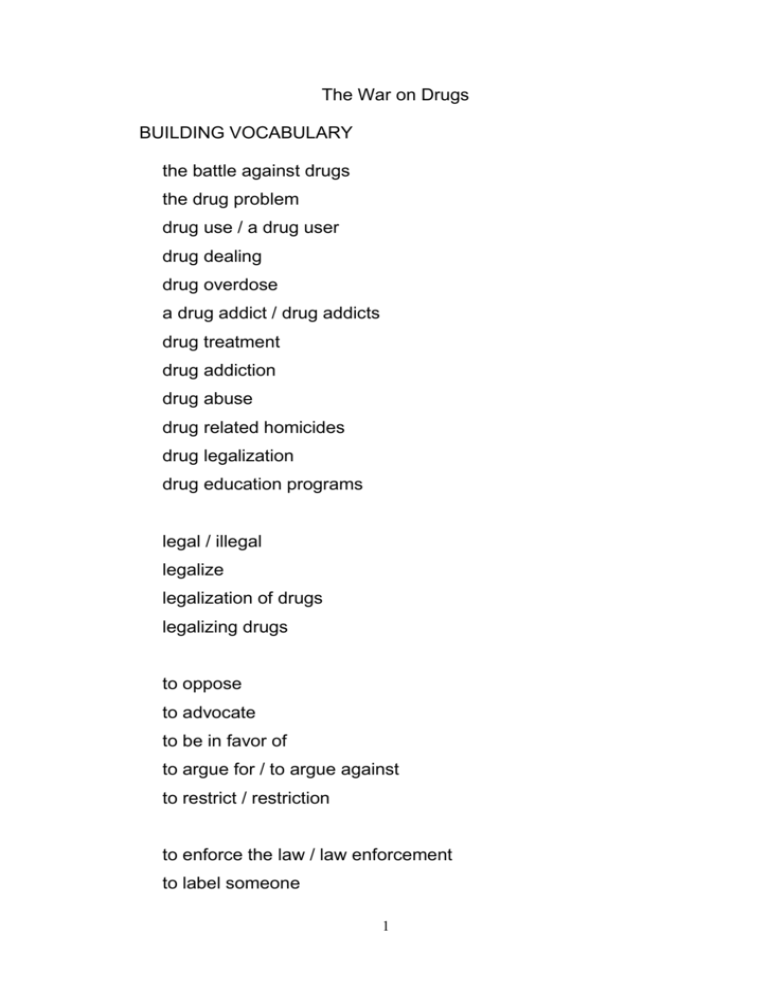
The War on Drugs BUILDING VOCABULARY the battle against drugs the drug problem drug use / a drug user drug dealing drug overdose a drug addict / drug addicts drug treatment drug addiction drug abuse drug related homicides drug legalization drug education programs legal / illegal legalize legalization of drugs legalizing drugs to oppose to advocate to be in favor of to argue for / to argue against to restrict / restriction to enforce the law / law enforcement to label someone 1 The War on Drugs A. Look at the following words and expressions. What do you think the text will be about? In favor of \ abuse \ addiction \ treatment \ Law-enforcement advocate \ decriminalization \ legalization \ argue \ oppose B. The War on Drugs: Opinions: Do you agree or disagree with the these opinions? 1. Over the past few decades the drug problem has become considerably worse. 2. Drug use has increased among teenagers. 3. Drug abuse is the result of poverty and inequality. 4. The battle against drugs is a failure. 5. People should be able to buy drugs legally the same way they buy cigarettes. 6. If drugs were legal, there would be fewer robberies and murders. 7. Legalizing drugs would lead to more addiction. 8. The drug problem can be solved by drug education programs. 9. Drug users should not be labeled criminals. 10. The government should try to protect us from harming ourselves by making drug use illegal. 2 The War on Drugs (609) From: Academic Encounters: Life in Society By Kristine Brown and Susan Hood, Cambridge, 2002 1. Over the last few decades, the drug problem in the United States (and in many other industrialized countries) has become considerably worse. In 1981, there were about 3 million drug addicts in the United States; today there are around 6 million. The number of drug overdose deaths and drug-related homicides has also increased. This is in spite of the fact that the government has spent more and more money in trying to solve the drug problem. The fight against drugs is often referred to as a "war" or "battle," and most experts now believe the battle against drugs has been a failure. They say it has failed because the government has focused on controlling the problem through laws and punishments, rather than through drug education and treatment. 2. The failure of the law-enforcement approach has led to calls for other approaches to solving the problem, including the decriminalization and the legalization of drugs. Advocates of decriminalization think that drug users should no longer be labeled as serious criminals and that the punishments for drug use should be significantly reduced. Advocates of legalization believe there should be no restriction on drug use at all, and that individuals should be able to buy drugs the same way they buy cigarettes and alcohol today. 3. Those who are in favor of legalization argue that the current drug laws do more harm than good. They argue that the current laws waste police time because while police officers are busy arresting people for smoking marijuana, they are not doing the work of arresting robbers and murderers. Further, they argue that the high cost of illegal drugs and the enormous amounts of money to be made from drug dealing encourage more serious crimes. For example, many drug users turn to stealing to support their habit and police can sometimes be bribed to "look the other way." Finally, those who support legalization believe that if drugs were legalized, the huge amounts of money currently spent on law enforcement could be used for drug treatment and education, which would drastically reduce drug use. 3 4. Those who oppose legalization respond that, if drugs are legalized, drug use and addiction will skyrocket. They point to the experience with alcohol, which was prohibited in the United States in the 1920s. At the end of this period, called Prohibition, the consumption of alcohol apparently soared by 350 percent (Bennet 1989). Others feel that the use of drugs is a stepping stone to other crimes – that, for example, the use of marijuana leads to the use of heroin or cocaine, and on to more serious crime. If drug use is stopped, this trend will be prevented. 5. Another aspect of the debate on whether or not drugs should be legalized involves the question of individual rights. Some people call for legalization because they feel they have the right to take drugs – that it is none of the government's business. They think that laws governing this behavior are an invasion of individual rights. On the other hand, others argue that the government should try to protect us from harming ourselves. 6. Finally, there are those who believe that the problem of widespread drug abuse and crime can only be solved when the government attacks the root causes of the problem: poverty, racism and inequality (Currie 1993). They propose that the government should deal with the factors that cause the problem by providing employment for all, increasing the minimum wage, improving health care for the poor, offering paid family leave, and providing affordable housing. 4 The War on Drugs – Questions Pre-Reading: Read the first paragraph and first sentence only of each paragraph. Circle the best answer. The author's purpose in this text is a. To explain why the battle against drugs has failed. b. To argue in favor of the legalization of drugs. c. To discuss the problem of widespread drug abuse. d. To present opposing approaches to the war on drugs. Close Reading Questions: PARAGRAPH ONE 1. Why do most experts think the battle against drugs has failed? ___________________________________________________________ ___________________________________________________________ PARAGRAPH 2 2. What do advocates of decriminalization want to change? a.______________________________________________________ b. _____________________________________________________ 3. What do advocates of legalization want to change? a. ___________________________________________________ b. ___________________________________________________ PARAGRAPH 3 4. Why do advocates of legalization think the current laws waste police time? ______________________________________________________________ ______________________________________________________________ 5..What is a possible result of the high cost of illegal drugs?) ______________________________________________________________ ______________________________________________________________ 5 6. For what would advocates of legalization prefer to spend money? a. _________________________________________________ b. _________________________________________________ PARAGRAPH 4 7. What do opponents of legalization think will happen if drugs are legalized? Circle the correct answer. a. drug use will decrease greatly. b. drug use will lead to alcohol use. c. drug use will increase greatly d. drug users will explode. 8. Decide if the following sentence is true or false. Circle the correct answer. TRUE FALSE “At the end of the period of Prohibition, people stopped drinking alcohol.” Justification: ______________________________________________________________ ______________________________________________________________ 9. What does "this trend" in the last sentence of paragraph 4 refer to? ______________________________________________________________ ______________________________________________________________ 10. PARAGRAPH 5 a. Why are some people in favor of legalizing drugs? ______________________________________________________________ ______________________________________________________________ b. What do opponents of legalization think about the role of government? ______________________________________________________________ ______________________________________________________________ 6 PARAGRAPH 6 11..What do some people think really causes drug abuse? (3 words only) ______________________________________________________________ ______________________________________________________________ 12. What should the government do to solve the drug problem? Give 5 suggestions. a. _________________________________________________ b. _________________________________________________ c. _________________________________________________ d__________________________________________________ e. _________________________________________________ POST-READING: 13. According to the entire article, which approach to fighting drugs do you think is more convincing? Circle one answer. LEGALIZATION LAW-ENFORCEMENT EXPLAIN THE REASON FOR YOUR CHOICE: ___________________________________________________________ ___________________________________________________________ ___________________________________________________________ ___________________________________________________________ ___________________________________________________________ ___________________________________________________________ ___________________________________________________________ 7 The War On Drugs Vocabulary: Match the words with their meanings 1. Over the last few decades, the drug problem in the U.S. has become considerably worse. 2. Over the last few decades, the drug problem in the U.S. has become considerably worse. 3. The failure of the lawenforcement approach has led to calls for other approaches to solving the problem 4. Advocates of decriminalization think that drug users should no longer be labeled as serious criminals. 5. Advocates of decriminalization think that drug users should no longer be labeled as serious criminals. 6. Advocates of decriminalization think that punishments for drug use should be significantly reduced. 7. They think that punishments should be significantly reduced. 8. Those who oppose legalization point to alcohol which was prohibited in the United States in the 1920’s 9. Alcohol was prohibited in the United States in the 1920’s 10. At the end of Prohibition, consumption of alcohol soared 11. Another aspect of the debate involves the question of individual rights. 12. The government should try to protect us from harming ourselves 13. The problem of widespread drug abuse can be solved only by attacking the root causes 8 a. occurring in many places (adj.) b. to be against something (v) c. a method to solve a problem (n) d. ten years (n) e. to hurt (v) f. in a large and important way (adverb) g. use (n) h. to make illegal (v) i. people in favor of something (n) j. to include (v) k. to make less (v) l. considerably (adverb) M using a word to describe someone (v)
